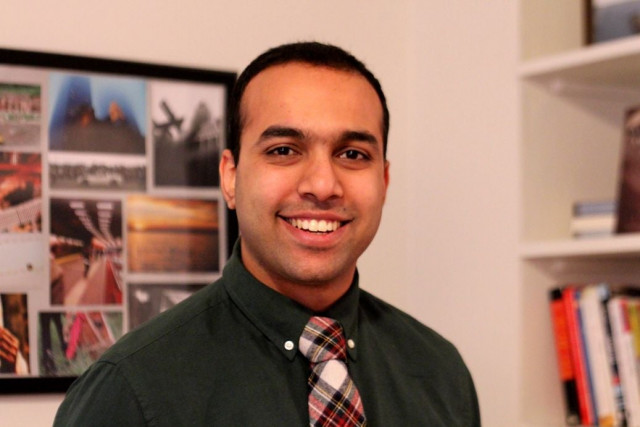Who are you?: ‘Pakistani state has no right to define identity for the people’
Haider Warraich shared views at the lecture 'Pakistan ka Matlab Kya: Search for Identity through Wars and Words'

Haider Warraich. PHOTO: AKU
The concept of national identity is a mere artefact created by the state. In reality, the Pakistani state has no right to tell its citizens what their identity is since this is something that people should be allowed to explore and discover on their own.
Haider Warraich, a faculty member at Harvard Medical School and an alumnus of Aga Khan University class of 2009, shared these views at the Special Lecture Series titled 'Pakistan ka Matlab Kya: Search for Identity through Wars and Words' at Aga Khan University. He is a regular contributor to various international publications and has also authored a novel, titled 'Auras of the Jinn — A Pakistani Story'.
Sharing pictorial accounts from his visit to the Swat Valley, Warraich said that all the beauty that surrounds Swat comes with a blemish — the barbed wires. He described the children of Swat as 'braver than the Army soldiers fighting in the region'. According to him, nothing else appears a better beacon of hope than children making their way to schools despite the fact that they have been a favourite spot of focus for the militants throughout time. "Education can redefine our identity," he said. "Education has always been part of our culture, in fact for a much greater time than Islam has been."

Warraich took the audience back to the times of the Boston Bombings of 2013 when every South Asian who was in the vicinity was eyed as a potential suspect. He narrated his publication from The New York Times, titled 'Living through Terror from Boston to Rawalpindi', in which he found himself at crossroads: he was torn between his identity as a physician, a victim and a potential suspect. According to him, it was then that the realisation dawned upon him that as Pakistanis our identity remains unidentified.
"I began trying to trace the common thread among all of our people from Gilgit to Gwadar," he said. "So far, the only thing we agree on is that we disagree on everything."
Talking about how identity has been socially engineered by the state and taught to us through the curricula in school, Warraich said that national identity failed people by attaching religion to it. "Normally, religions adapt to the locals of the land," he said. "In Pakistan, the case has been the opposite, especially since the separation of East Pakistan. The solution then became to whitewash the local culture." He added that the 'divisive' two-nation theory damages our integrity even to this date so much so that everyone wants a 'land of pure' of their own.
He further talked about how a common perception prevailed among the Muslims even after the 1857 War of Independence that Muslim children were born to rule and were not meant for school or civil service. He was of the view that the pattern continues even today. "Education is what we should be known for," he said.
Published in The Express Tribune, April 22nd, 2015.



















COMMENTS
Comments are moderated and generally will be posted if they are on-topic and not abusive.
For more information, please see our Comments FAQ